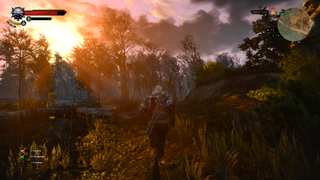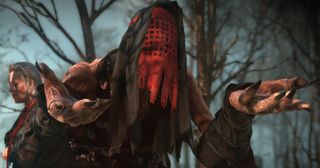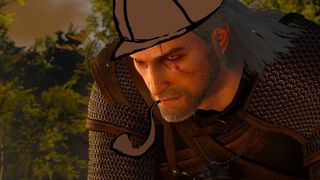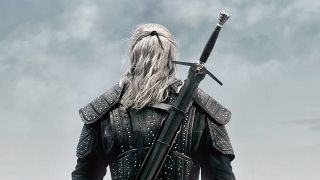How The Witcher 3 puts misery back into mythology

There's a flavour of horror that games do so well. It's a sickening feeling that seeps into your pores as you explore a relentlessly grotesque environment. A game world has many ways to infect you with its worldview—NPC chatter, journal entries, enemy barks, architecture, even the ambient soundscape can communicate hopelessness and decrepitude. In the bogs of Velen it's hardly subtle. The hanging men; the pallid, half-mad inhabitants; the noxious fumes parping out of the marsh; the undead things crawling around in the mud—they're all part of a superliminal honk that says "humans don't belong here". The message grows louder the moment you meet the three bog witches. Have they warped the marshlands to mirror their nature, or was this naturally-occurring cesspit too grim to pass up?
Places like Velen make The Witcher 3 extraordinary, even though there's nothing innovative about the way the game world speaks to players, and nothing especially new about the feudal fantasy kings, elves 'n dwarves setting. There's great tonal consistency however throughout the game's dialogue, quest text, bestiary entries, environmental and audio design. That services The Witcher 3's mythology, plucked from old European myths re-appropriated by Andrzej Sapkowski's Witcher novels. The result is an unusually coherent take on the staid mud 'n blood fantasy formula, elevated by a fresh treatment of familiar old myths.
The skull-faced Wild Hunt are derived from the European folk villains of the same name, described as a host of ghostly riders who ride through the sky stealing folk and cursing witnesses with bad luck. Most of Geralt's foes have similar roots, but clever audiovisual design separates them from the rehashed archetypes we're used to. Think of those witches again. They look unlike any other videogame villains—diseased, hunched, basket-faced, sagging under the weight of hampers of bloodied limbs. It's the "double, double toil and trouble" coven, reinvented with a Welsh lilt and reams of scarred flesh.

The Witcher series has a knack for capturing myths at an unsanitised pre-Disney, pre-Tolkien phase, before beastfolk have been assigned to the 'good' or 'evil' columns of the grand fantasy race roster. There's no 'elves good/orcs bad' logic here. These aren't morality tales; the world operates in a moral haze as grey as Geralt's short 'n curlies. The Witcher 3's curses and hauntings aren't punishments from god either, much as some poor afflicted people might think so. The Witcher's villains are forces of nature, amoral and unconcerned with the wellbeing of humans. They're animals and natural phenomenon that have been elevated to myth status by humans who couldn't possibly know better. The Witcher 3 even mimics the inconsistency of the peasants' oral tradition by giving its monsters many names.
The Witcher 3 is still an effective power fantasy, even though it's fundamentally a game about little people who have it bad.
None of this would work without Geralt's rational, agnostic perspective. One of the advantages of having a strong individual main character, as opposed to the ensemble setup of a Bioware RPG (which has its own merits), is the strong take they give you on the world they inhabit. Geralt's view is that of a natural scientist, born into a society that only has use for his expertise in an exterminator capacity. The man knows as much about the mating habits of your garden variety Royal Gryphon as he does about swinging a sword. He's a chemist. He's better educated and more traveled than the most powerful people in the land. Though you spend a lot of time killing, Geralt's smarts put you in a position to affect the status quo. That's why The Witcher 3 is still an effective power fantasy, even though it's fundamentally a game about little people who have it bad.


Geralt of Rivia and his band of merry monsters are starring in a Netflix show debuting late in 2019 based on the novels by Andrzej Sapkowski. Check out everything we know about Netflix's The Witcher, from casting, to trailers, to story.
It's also why the monsters feel like more than typical videogame fodder. To Geralt there's little difference between a ghoul problem and plague. His scientific perspective turns slots high-fantasy villains into the same category as a natural disaster, or an epidemic, or other far more relatable fears. In The Witcher 3 a spirit that torments its captor doesn't care about the host's wants, desires and social status, it's just a parasite feeding according to its nature. That's much more disturbing.
The Witcher 3 also lets you talk to the monsters, and they have more interesting things to say than creatures in most other RPGs. Even creatures that can't speak (or don't feel like speaking to Geralt) are given a voice, through their writings, or vicariously through NPCs. I laughed with delight when I found out what the frost giant CD Projekt have shown in trailers actually wants. I'd assumed, thanks to most other RPGs, that he was just a big dumb boss monster, but through scraps of information you discover that he has his own perspective on the universe. He's got his own plans, and they have very little to do with the wretched humans buzzing around his island.
The biggest gaming news, reviews and hardware deals
Keep up to date with the most important stories and the best deals, as picked by the PC Gamer team.
Fantasy games tend to empower players by giving us the authority to influence human affairs in worlds that revolve entirely around humans. In The Witcher 3 humanity clings to a world that's indifferent to its existence. It's grim, but I love it. In the Northern Kingdoms the forces of darkness are much more colourful and charismatic than the light.
Part of the UK team, Tom was with PC Gamer at the very beginning of the website's launch—first as a news writer, and then as online editor until his departure in 2020. His specialties are strategy games, action RPGs, hack ‘n slash games, digital card games… basically anything that he can fit on a hard drive. His final boss form is Deckard Cain.

Witcher author reveals that Geralt is 61 years old in The Witcher 3, with even weirder ramifications for Henry Cavill's Netflix performance

CD Projekt had to nerf Ciri for The Witcher 4 after she fully unlocked her spacetime teleportation powers in the previous game: 'Something totally happened in-between'
Most Popular



